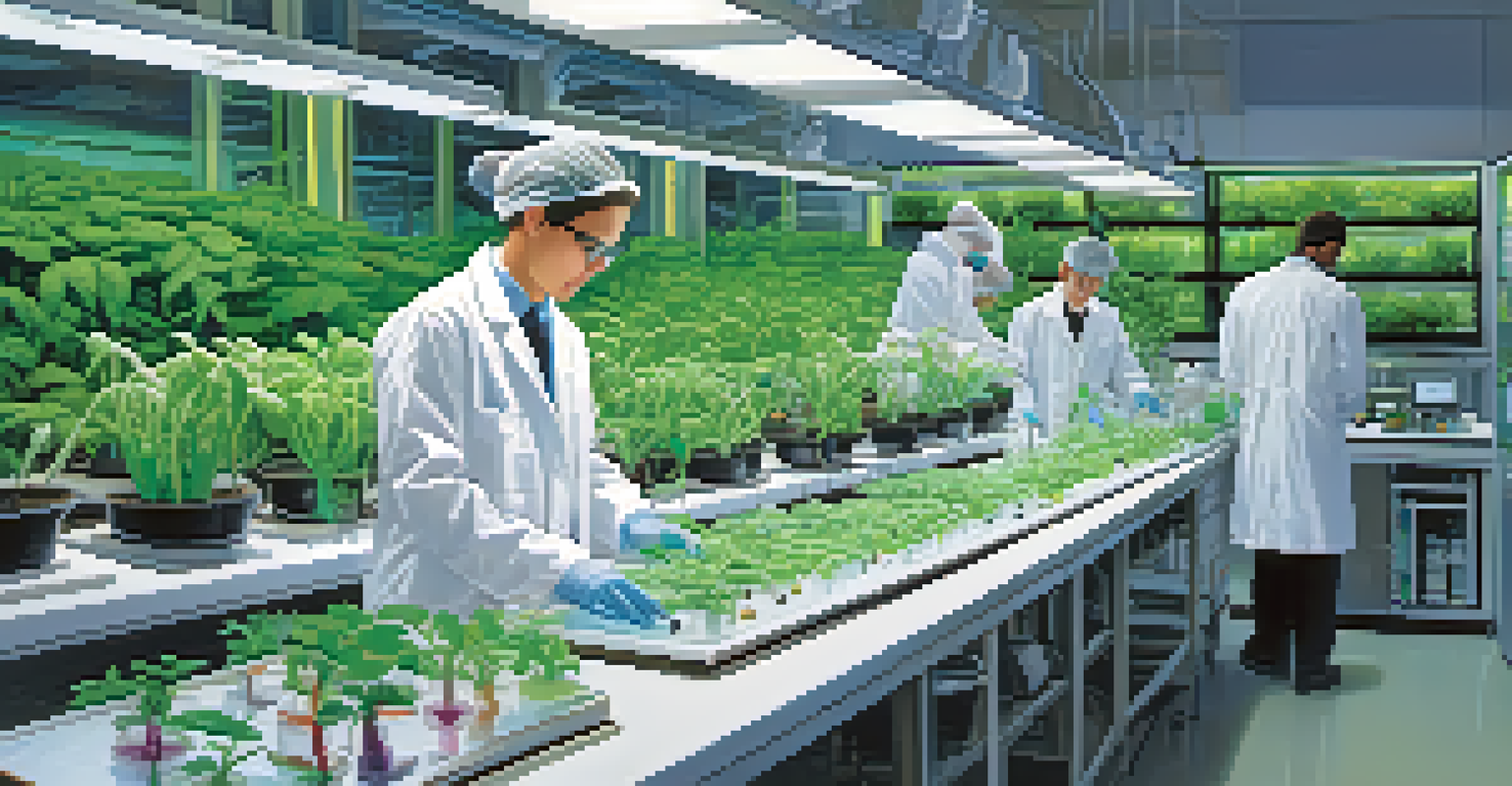Plant Genetics: Enhancing Energy Production in Biofuels

Understanding Biofuels and Their Importance
Biofuels are renewable energy sources derived from organic materials, primarily plants. They play a vital role in reducing greenhouse gas emissions and decreasing our reliance on fossil fuels. By converting plant matter into energy, biofuels offer a sustainable alternative for powering vehicles, heating homes, and generating electricity.
The greatest threat to our planet is the belief that someone else will save it.
The significance of biofuels extends beyond environmental benefits; they also contribute to energy security and economic growth. As countries strive to meet renewable energy targets, biofuels are becoming increasingly essential. This leads to a growing interest in improving their production efficiency through innovative techniques.
One promising avenue for enhancing biofuel production lies in plant genetics. By understanding and manipulating the genetic makeup of plants, scientists can develop varieties that produce more biomass and yield higher amounts of energy-rich compounds.
The Role of Plant Genetics in Biofuel Production
Plant genetics involves the study of genes and their functions to improve plant traits. In the context of biofuels, this means identifying and altering specific genes that affect biomass growth, sugar content, and oil production. By enhancing these traits, researchers can create plants that are more efficient for biofuel conversion.

For example, genetic modifications can lead to increased cellulose content in plants, which is crucial for producing cellulosic ethanol—a type of biofuel derived from plant fibers. Higher cellulose levels mean more sugar is available for fermentation, ultimately boosting fuel yield.
Biofuels Reduce Fossil Fuel Dependence
Biofuels, derived from organic materials, provide a renewable energy source that helps decrease greenhouse gas emissions and reliance on fossil fuels.
Moreover, genetic engineering techniques like CRISPR allow for precise alterations without introducing foreign DNA. This means that crops can be made more resilient to pests and environmental stress while optimizing their biofuel potential at the same time.
Exploring Advanced Breeding Techniques
Traditional breeding methods have been used for decades to enhance desirable traits in plants. However, advanced breeding techniques such as marker-assisted selection and genomic selection are revolutionizing this field. These methods enable scientists to select plants with the best genetic traits more efficiently.
Innovation is the ability to see change as an opportunity – not a threat.
Marker-assisted selection uses genetic markers to identify plants with desirable features, making it easier to breed for traits that enhance biofuel production. Genomic selection, on the other hand, involves analyzing the entire genome to predict the best candidates for breeding.
These advanced techniques not only speed up the breeding process but also lead to more precise outcomes, ultimately resulting in crops that can produce more energy while requiring fewer resources.
Improving Crop Resilience for Sustainable Production
As climate change poses challenges to agriculture, improving crop resilience is crucial for sustainable biofuel production. Genetic research aims to develop varieties that can withstand extreme weather conditions, pests, and diseases. This resilience ensures a stable supply of biomass for biofuel production.
For instance, researchers are looking at the genes responsible for drought tolerance in certain plants. By incorporating these traits into biofuel crops, farmers can maintain productivity even during dry spells, thus securing a consistent energy source.
Genetics Boost Biofuel Crop Efficiency
Advancements in plant genetics enable the development of crops with enhanced traits, leading to increased biomass and energy yields for biofuel production.
Additionally, resilient crops contribute to environmental sustainability by reducing the need for chemical inputs, such as fertilizers and pesticides, creating a more eco-friendly biofuel production process.
The Future of Biofuels: Innovations on the Horizon
The future of biofuels looks promising, thanks in part to advancements in plant genetics. Emerging technologies, such as synthetic biology and metabolic engineering, are paving the way for the creation of entirely new biofuel-producing plants. These innovations could lead to crops that not only grow faster but also produce higher yields of energy-rich substances.
One exciting development is the engineering of algae for biofuel production. Algae can be modified to enhance oil content and growth rates, making them an efficient source of biodiesel. This shift towards unconventional biofuel sources could diversify energy production options.
As research continues, the potential for plant genetics to transform biofuels is immense. The integration of innovative techniques and a deeper understanding of plant biology will likely play a pivotal role in meeting future energy demands.
Economic Implications of Enhanced Biofuel Production
Enhancing biofuel production through plant genetics has significant economic implications. Increased efficiency and yields can lower production costs, making biofuels more competitive with fossil fuels. This economic viability is crucial for attracting investment in biofuel technologies and infrastructure.
Furthermore, the development of biofuel crops can create new markets for farmers, providing additional income streams. As demand for renewable energy sources grows, farmers who cultivate genetically optimized crops will be at the forefront of this emerging industry.
Economic Growth Through Biofuels
Improving biofuel production efficiency can lower costs and create new markets for farmers, driving economic growth in agriculture and renewable energy sectors.
With supportive policies and research funding, the biofuel sector could stimulate job creation in agriculture, biotechnology, and energy industries, contributing to overall economic growth.
Conclusion: A Sustainable Energy Future with Plant Genetics
In summary, the intersection of plant genetics and biofuel production holds great promise for a sustainable energy future. By improving the traits of biofuel crops, we can enhance biomass yields, increase energy content, and create more resilient plants. These advancements not only address current energy challenges but also pave the way for innovative solutions.
As we continue to explore the potential of plant genetics, it's essential to balance technological advancements with ecological sustainability. The goal is to develop biofuels that meet energy demands while minimizing environmental impact.

Ultimately, investing in plant genetics for biofuel production not only fuels our vehicles but also fuels our planet's future, ensuring a cleaner, greener world for generations to come.